Category: Digital Economy
Taxation and allocation of income generated from cross-border activities in the digital economy – Google, Apple, Microsoft, Netflix, Ebay, Amazon, Facebook, Alibaba, Baidu, Tencent, Uber, Airbnb, Expedia, PayPal etc.

Uncovering Low Tax Jurisdictions and Conduit Jurisdictions
By Javier Garcia-Bernardo, Jan Fichtner, Frank W. Takes, & Eelke M. Heemskerk Multinational corporations use highly complex structures of parents and subsidiaries to organize their operations and ownership. Offshore Financial Centers (OFCs) facilitate these structures through low taxation and lenient regulation, but are increasingly under scrutiny, for instance for enabling tax avoidance. Therefore, the identifcation of OFC jurisdictions has become a politicized and contested issue. We introduce a novel data-driven approach for identifying OFCs based on the global corporate ownership network, in which over 98 million firms (nodes) are connected through 71 million ownership relations. This granular firm-level network data uniquely allows identifying both sink-OFCs and conduit-OFCs. Sink-OFCs attract and retain foreign capital while conduit-OFCs are attractive intermediate destinations in the routing of international investments and enable the transfer of capital without taxation. We identify 24 sink-OFCs. In addition, a small set of countries – the Netherlands, the United Kingdom, Ireland, Singapore and Switzerland – canalize the majority of corporate offshore investment as conduit-OFCs. Each conduit jurisdiction is specialized in a geographical area and there is signifcant specialization based on industrial sectors. Against the idea of OFCs as exotic small islands that cannot be regulated, we show that many sink and conduit-OFCs are highly developed countries. Conduits-and-Sinks-in-the-Global-Corporate-Ownership-Network.pdf
European Commission vs Amazon and Luxembourg, December 2023, European Court of Justice, Case No C‑457/21 P
In 2017 the European Commission concluded that Luxembourg had granted undue tax benefits to Amazon of around €250 million. According to the Commission, a tax ruling issued by Luxembourg in 2003 – and prolonged in 2011 – lowered the tax paid by Amazon in Luxembourg without any valid justification. The tax ruling enabled Amazon to shift the vast majority of its profits from an Amazon group company that is subject to tax in Luxembourg (Amazon EU) to a company which is not subject to tax (Amazon Europe Holding Technologies). In particular, the tax ruling endorsed the payment of a royalty from Amazon EU to Amazon Europe Holding Technologies, which significantly reduced Amazon EU’s taxable profits. This decision was brought before the European Courts by Luxembourg and Amazon, and in May 2021 the General Court found that Luxembourg’s tax treatment of Amazon was not illegal under EU State aid rules. An appeal was then filed by the European Commission with the European Court of Justice. Judgement of the Court The European Court of Justice upheld the decision of the General Court and annulled the decision of the European Commission. However, it did so for different reasons. According to the Court of Justice, the OECD Transfer Pricing Guidelines were not part of the legal framework against which a selective advantage should be assessed, since Luxembourg had not implemented these guidelines. Thus, although the General Court relied on an incorrect legal framework, it had reached the correct result. Click here for other translation
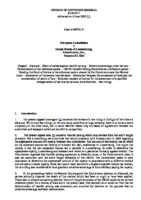
European Commission vs. Amazon and Luxembourg, June 2023, European Court of Justice – Opinion, Case No C‑457/21 P
In 2017, the European Commission concluded that Luxembourg in violation with EU state aid-rules had granted undue tax benefits to Amazon of around €250 million. According to the Commission, a tax ruling issued by Luxembourg in 2003 and extended in 2011 reduced the taxes paid by Amazon in Luxembourg without any valid justification. The tax ruling allowed Amazon to shift the vast majority of its profits from an Amazon group company subject to tax in Luxembourg (Amazon EU) to a company not subject to tax (Amazon Europe Holding Technologies). In particular, the tax ruling endorsed the payment of a royalty by Amazon EU to Amazon Europe Holding Technologies, which significantly reduced Amazon EU’s taxable profits. This decision was challenged by Luxembourg and Amazon before the European General Court. In a judgement issued in May 2021, the European General Court found that Luxembourg’s tax treatment of Amazon was not illegal under EU state aid rules. The Commission then filed an appeal with to the European Court of Justice. Preliminary Opinion of the Advocate General In a preliminary opinion, Advocate General Kokott proposes that the Court dismiss the Commission’s appeal. Excerpts: “109. The Commission – as the General Court stated in paragraph 530 of the judgment under appeal – had not succeeded in establishing that, had the profit split method on the basis of the contribution analysis been applied, LuxOpCo’s remuneration would have been greater. Accordingly, it held that the first subsidiary finding did not support the conclusion that the tax ruling at issue conferred an economic advantage on LuxOpCo. In the General Court’s view, apart from the fact that the Commission had not sought to determine what LuxOpCo’s arm’s length remuneration would have been in the light of the functions identified by the Commission in its own functional analysis, the first subsidiary finding contained no specific evidence to establish to the requisite legal standard that the errors in the functional analysis and the methodological error identified by the Commission, relating to the choice of method itself, had actually led to a reduction in LuxOpCo’s tax burden. 110. In addition, as the General Court noted with regard to the second subsidiary finding of an economic advantage (paragraph 547 of the judgment under appeal), it should be held that the Commission had not sought to ascertain that it was arm’s length remuneration or, a fortiori, whether LuxOpCo’s remuneration, endorsed by the tax ruling at issue, was lower than the remuneration that LuxOpCo would have received under arm’s length conditions. 111. Moreover, the General Court held in paragraph 585 of the judgment under appeal with regard to the third subsidiary finding that, as inappropriate as the ceiling mechanism may have been, and although it was not provided for in the 1995 version of the OECD Guidelines, the Commission had not demonstrated that that mechanism had an impact on the arm’s length nature of the royalty paid by LuxOpCo to LuxSCS. 112. Overall, the General Court concluded that the Commission had not succeeded in demonstrating the existence of an advantage through any of its three subsidiary findings (paragraphs 537, 548 and 586 of the judgment under appeal).” “(…)In accordance with settled case-law of the Court of Justice, it is for the Commission to prove the existence of ‘State aid’ as provided for in Article 107(1) TFEU and thus also to prove that the condition of granting an advantage to the beneficiaries is fulfilled. (42) That requires the Commission, in the present case, to demonstrate that Amazon received an advantage. However, the selective advantage only arises from the tax ruling conferring more favourable treatment compared to normal taxation. The Commission has to demonstrate such more favourable treatment. 119. The Commission must also carry out an overall assessment taking into account every significant element of the case in question which enables it to establish whether the recipient undertaking would not have received such relief already from the normal tax system (reference system). In the area of transfer pricing, that depends on the Commission being in a position to calculate the ‘correct’ transfer price. 120. The Commission is correct in its objection that that is very complex. However, it submits once more that not every misapplication of national tax law can simultaneously constitute a selective advantage, (43) but only manifestly erroneous findings in the tax ruling which affect the amount of tax due. 121. If the calculation of the royalty endorsed in the tax ruling would, in spite of its questionable methodology, have been lower than the usual transfer price, then there has been no more advantageous treatment of Amazon in comparison to normal taxation. After all, a higher normal transfer price would have resulted in an even lower tax burden. The General Court was correct in criticising the absence of such a comparison. In that respect, the second ground of appeal is also unfounded. C. Conclusion 122. In conclusion, both of the Commission’s grounds of appeal are unfounded. It has emerged that the judgment under appeal is correct in its outcome – albeit for reasons other than those on which the General Court relied. Apart from anything else, the decision had to be annulled because the reference system (the OECD Transfer Pricing Guidelines instead of Luxembourg law) relied on by the Commission was incorrect. 123. Moreover, the tax ruling does not contain any manifestly incorrect recognition – too favourable to the taxpayer – of the amount of the royalty payment. Even if the inclusion of a ceiling for the licence holder’s taxable income is manifestly incompatible with the method of calculating royalty payments usual between independent entities, the Commission failed to demonstrate in the decision that that also conferred an advantage.” Click here for other translations
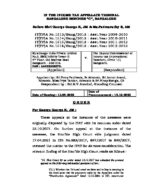
India vs Google India Private Limited, Oct. 2022, Income Tax Appellate Tribunal, 1513/Bang/2013, 1514/Bang/2013, 1515/Bang/2013, 1516/Bang/2013
Google Ireland licenses Google AdWords technology to its subsidiary in India and several other countries across the world. The Tax Tribunal in India found that despite the duty of Google India to withhold tax at the time of payment to Google Ireland, no tax was withheld. This was considered tax evasion, and Google was ordered to pay USD 224 million. The case was appealed by Google to the High Court, where the case was remanded to the Income Tax Appellate Authority for re-examination. Judgement of the ITAT After re-examining the matter on the orders of the Karnataka High Court, the Income Tax Appellate Authority concluded that the payments made by the Google India to Google Ireland between 2007-08 and 2012-13 was not royalties and therefore not subject to withholding tax. Excerpts “30. On a consideration of all the above agreements and the facts on record, we find that none of the rights as per section 14(a)/(b) and section 30 of the Copyright Act, 1957 have been transferred by Google Ireland to the assessee in the present case. As held by the Hon’ble Apex Court in the case of Engineering Analysis Centre of Excellence Private Limited v. CIT & Anr. (supra), mere use of or right to use a computer program without any transfer of underlying copyright in it as per section 14(a)/(b) or section 30 of the Copyright Act, 1957 will not be satisfying the definition of Royalty under the Act / DTAA. Similarly, use of confidential information, software technology, training documents and others are all ‘literary work’ with copyrights in it owned by the foreign entity and there was no transfer or license of copyrights in favour of the assessee company. Hence, the impugned payments cannot be characterised as ‘Royalty’ under the DTAA. 31. The lower authorities have held that the assessee has been granted the use of or right to use trademarks, other brand features and the process owned by Google Ireland for the purpose of distribution of Adwords program and consequently the sums payable to Google Ireland are royalty. As per Article 12 of India – Ireland DTAA, consideration for the use of or right to use any patent, trade mark, design or model, plan, secret formula or process is regarded as royalty. In the present case, as per the distribution agreement, “Google Brand Features” means the Google trade names, trademarks, service marks, logos, domain names, and other distinctive brand features, with some but not all examples at “http://www.google.com/permissions/trademarks.html” (or such other URL that Google may provide from time to time), and such other trade names, trademarks, service marks, logos, domain names, or other distinctive brand features that Google may provide to Distributor for use solely under this Agreement. As per para 6 of the distribution agreement, each party shall own all right, title and interest, including without limitation all Intellectual Property Rights, relating to its Brand Features and Google Irland grants to the assessee / distributor nonexclusive and nonsublicensable licence during the Term to display Google Brand Features solely for the purpose of distributor’s marketing and distribution of AdWords Program under the terms and subject to the conditions set forth in this Agreement. It is thus evident that the trademark and other brand features are not used independently or de hors the distribution agreement but they are incidental or ancillary for the purpose of carrying out the marketing and distribution of Adword program. The Delhi High Court in DIT v Sheraton International Inc [2009] 313 ITR 267 held that when the use of trade mark, trade name etc are incidental to the main service of advertisement, publicity and sales promotion and further when there is no consideration payable for such use of trade mark, trade name etc, the consideration cannot be characterised as royalty. Applying the said principle, in the present case, use of Google Brand Features etc are de hors any consideration payable to Google Ireland and further they are incidental and ancillary for achieving the main purpose of marketing and distributing the Google Adwords Program. Hence, the lower authorities were not right in treating the payments as Royalty. 32. As regards the applicability of ‘use of or right to use industrial, commercial or scientific equipment” the CIT(A) held that the assessee cannot be said to have gained right to use any scientific equipment, since, Google Ireland has not parted with the copyright it holds in the Adwords program and hence it cannot be said that any kind of technical knowhow has been transferred to the assessee company. The CIT(A) was not in agreement with the AO on the above issue without prejudice to his view in holding that the remitted amount is royalty on different grounds. The revenue has not challenged the said finding of CIT(A). Hence, the impugned payments cannot be regarded as made for ‘use of or right to use industrial, commercial or scientific equipment’. The remaining portion of definition of ‘Royalty’ under the India – Ireland DT AA is consideration for information concerning industrial, commercial or scientific experience. The AO has not characterised the impugned payments as a consideration for the above. In any case, CIT(A) has given a finding that it cannot be said that any kind of technical knowhow has been transferred to the assessee company. This has not been challenged by the revenue. 33. Thus on an overall analysis of the entire facts on record, we hold that the impugned payments cannot be regarded as royalty under the India – Ireland DTAA. It is true that the Google Adword program was commercially and profitably exploited in a commercial sense and profitable manner in India to generate revenues from Indian customers or advertisers. This is the business or commercial aspect of the transaction. However, the stand of the lower authorities that the impugned payments are in the nature of Royalty cannot be upheld especially under Article 12 of the India – Ireland DTAA merely because the marketing, distribution and ITES activities are carried out in India and revenues are
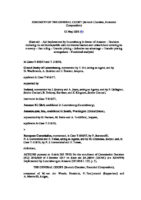
European Commission vs. Amazon and Luxembourg, May 2021, State Aid – European General Court, Case No T-816/17 and T-318/18
In 2017 the European Commission concluded that Luxembourg granted undue tax benefits to Amazon of around €250 million. Following an in-depth investigation the Commission concluded that a tax ruling issued by Luxembourg in 2003, and prolonged in 2011, lowered the tax paid by Amazon in Luxembourg without any valid justification. The tax ruling enabled Amazon to shift the vast majority of its profits from an Amazon group company that is subject to tax in Luxembourg (Amazon EU) to a company which is not subject to tax (Amazon Europe Holding Technologies). In particular, the tax ruling endorsed the payment of a royalty from Amazon EU to Amazon Europe Holding Technologies, which significantly reduced Amazon EU’s taxable profits. This decision was brought before the European Court of Justice by Luxembourg and Amazon. Judgement of the EU Court The European General Court found that Luxembourg’s tax treatment of Amazon was not illegal under EU State aid rules. According to a press release ” The General Court notes, first of all, the settled case-law according to which, in examining tax measures in the light of the EU rules on State aid, the very existence of an advantage may be established only when compared with ‘normal’ taxation, with the result that, in order to determine whether there is a tax advantage, the position of the recipient as a result of the application of the measure at issue must be compared with his or her position in the absence of the measure at issue and under the normal rules of taxation. In that respect, the General Court observes that the pricing of intra-group transactions carried out by an integrated company in that group is not determined under market conditions. However, where national tax law does not make a distinction between integrated undertakings and standalone undertakings for the purposes of their liability to corporate income tax, it may be considered that that law is intended to tax the profit arising from the economic activity of such an integrated undertaking as though it had arisen from transactions carried out at market prices. In those circumstances, when examining a fiscal measure granted to such an integrated company, the Commission may compare the tax burden of that undertaking resulting from the application of that fiscal measure with the tax burden resulting from the application of the normal rules of taxation under national law of an undertaking, placed in a comparable factual situation, carrying on its activities under market conditions. In addition, the General Court points out that, in examining the method of calculating an integrated company’s taxable income endorsed by a tax ruling, the Commission can find an advantage only if it demonstrates that the methodological errors which, in its view, affect the transfer pricing do not allow a reliable approximation of an arm’s length outcome to be reached, but rather lead to a reduction in the taxable profit of the company concerned compared with the tax burden resulting from the application of normal taxation rules. In the light of those principles, the General Court then examines the merits of the Commission’s analysis in support of its finding that, by endorsing a transfer pricing method that did not allow a reliable approximation of an arm’s length outcome to be reached, the tax ruling at issue granted an advantage to LuxOpCo. In that context, the General Court holds, in the first place, that the primary finding of an advantage is based on an analysis which is incorrect in several respects. Thus, first, in so far as the Commission relied on its own functional analysis of LuxSCS in order to assert, in essence, that contrary to what was taken into account in granting the tax ruling at issue, that company was merely a passive holder of the intangible assets in question, the General Court considers that analysis to be incorrect. In particular, according to the General Court, the Commission did not take due account of the functions performed by LuxSCS for the purposes of exploiting the intangible assets in question or the risks borne by that company in that context. Nor did it demonstrate that it was easier to find undertakings comparable to LuxSCS than undertakings comparable to LuxOpCo, or that choosing LuxSCS as the tested entity would have made it possible to obtain more reliable comparison data. Consequently, contrary to its findings in the contested decision, the Commission did not, according to the General Court, establish that the Luxembourg tax authorities had incorrectly chosen LuxOpCo as the ‘tested party’ in order to determine the amount of the royalty. Secondly, the General Court holds that, even if the ‘arm’s length’ royalty should have been calculated using LuxSCS as the ‘tested party’ in the application of the TNMM, the Commission did not establish the existence of an advantage since it was also unfounded in asserting that LuxSCS’s remuneration could be calculated on the basis of the mere passing on of the development costs of the intangible assets borne in relation to the Buy-In agreements and the cost sharing agreement without in any way taking into account the subsequent increase in value of those intangible assets. Thirdly, the General Court considers that the Commission also erred in evaluating the remuneration that LuxSCS could expect, in the light of the arm’s length principle, for the functions linked to maintaining its ownership of the intangible assets at issue. Contrary to what appears from the contested decision, such functions cannot be treated in the same way as the supply of ‘low value adding’ services, with the result that the Commission’s application of a mark-up most often observed in relation to intra-group supplies of a ‘low value adding’ services is not appropriate in the present case. In view of all the foregoing considerations, the General Court concludes that the elements put forward by the Commission in support of its primary finding are not capable of establishing that LuxOpCo’s tax burden was artificially reduced as a result of an overpricing of the royalty. In the second place, after examining the
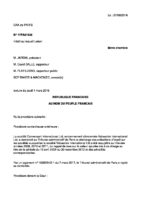
France vs Valueclick Ltd. Dec 2020, Supreme Administrative Court (CAA), Case No 420174
The issue in the case before the Supreme Administrative Court was whether an Irish company had a PE in France in a situation where employees of a French company in the same group carried out marketing, representation, management, back office and administrative assistance services on behalf of the group. The following facts were used to substantiate the presence of a French PE: French employees negotiated the terms of contracts and were involved in drafting certain contractual clauses with the customers. Contracts were automatically signed by the Irish company – whether this action corresponded to a simple validation of the contracts negotiated and drawn up by the managers and employees in France. Local advertising programs were developed and monitored by employees in France. French employees acted to third parties as employees of the Irish company. Customers did not distinguish between the Irish and the French company. In a 2018 decision the Administrative Court had found that none of these factors established that employees in France had been authorized to act on behalf of and in the name of the Irish company. The Administrative Court instead based the decision on whether contracts could be entered and services could be rendered without prior approval of the contracts by the Irish parent entity. The Court concluded that French employees could not commit its Irish principal contractually and services could not be rendered until the customer contract had been approved by the Irish company. The Supreme Administrative Court (CAA) overturned the decision of the Administrative Court. “...it is clear from the documents in the file submitted to the trial judges that the French company has the human resources to enable it to provide the services of the Irish company independently, in particular the human resources to enable it to decide to conclude a contract with an advertiser for the provision of services operated by the Irish company.” “…the French company must be regarded as having the appropriate technical resources to make it possible for the Irish company to provide the services autonomously, even though no data center used to carry out the linking functions is located in France, nor, for that matter, in Ireland.” On the issue of permanent establishment, see also the French Zimmer decision from 2010 and the later Google decision from 2017. Click here for English Translation Click here for other translation

European Commission vs. Ireland and Apple, September 2020, Appeal of the Judgement of the General Court on the Apple tax State aid case in Ireland
The European Commission has decided to appeal the decision of the EU General Court in the State Aid case of Apple and Ireland. According to the European Commission Ireland gave illegal tax benefits to Apple worth up to €13 billion, because it allowed Apple to pay substantially less tax than other businesses. In a decision issued july 2020 the General Court held in favor of Apple and Ireland. This decision will now be reviewed by the European Court of Justice. “Statement by Executive Vice-President Margrethe Vestager on the Commission’s decision to appeal the General Court’s judgment on the Apple tax State aid case in Ireland Brussels, 25 September 2020 “The Commission has decided to appeal before the European Court of Justice the General Court’s judgment of July 2020 on the Apple State aid case in Ireland, which annulled the Commission’s decision of August 2016 finding that Ireland granted illegal State aid to Apple through selective tax breaks. The General Court judgment raises important legal issues that are of relevance to the Commission in its application of State aid rules to tax planning cases. The Commission also respectfully considers that in its judgment the General Court has made a number of errors of law. For this reason, the Commission is bringing this matter before the European Court of Justice. Making sure that all companies, big and small, pay their fair share of tax remains a top priority for the Commission. The General Court has repeatedly confirmed the principle that, while Member States have competence in determining their taxation laws taxation, they must do so in respect of EU law, including State aid rules. If Member States give certain multinational companies tax advantages not available to their rivals, this harms fair competition in the European Union in breach of State aid rules. We have to continue to use all tools at our disposal to ensure companies pay their fair share of tax. Otherwise, the public purse and citizens are deprived of funds for much needed investments – the need for which is even more acute now to support Europe’s economic recovery. We need to continue our efforts to put in place the right legislation to address loopholes and ensure transparency. So, there’s more work ahead – including to make sure that all businesses, including digital ones, pay their fair share of tax where it is rightfully due.”
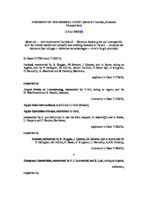
European Commission vs. Ireland and Apple, July 2020, General Court of the European Union, Case No. T-778/16 and T-892/16
In a decision of 30 August 2016 the European Commission concluded that Ireland’s tax benefits to Apple were illegal under EU State aid rules, because it allowed Apple to pay substantially less tax than other businesses. The decision of the Commission concerned two tax rulings issued by Ireland to Apple, which determined the taxable profit of two Irish Apple subsidiaries, Apple Sales International and Apple Operations Europe, between 1991 and 2015. As a result of the rulings, in 2011, for example, Apple’s Irish subsidiary recorded European profits of US$ 22 billion (c.a. €16 billion) but under the terms of the tax ruling only around €50 million were considered taxable in Ireland. Ireland appealed the Commission’s decision to the European Court of Justice. The Judgement of the European Court of Justice The General Court annuls the Commission’s decision that Ireland granted illegal State aid to Apple through selective tax breaks because the Commission did not succeed in showing to the requisite legal standard that there was an advantage for the purposes of Article 107(1) TFEU. According to the Court, the Commission was wrong to declare that Apple Sales International and Apple Operations Europe had been granted a selective economic advantage and, by extension, State aid. The Court considers that the Commission incorrectly concluded, in its primary line of reasoning, that the Irish tax authorities had granted Apple’s Irish subsidiaries an advantage as a result of not having allocated the Apple Group intellectual property licences to their Irish branches. According to the Court, the Commission should have shown that that income represented the value of the activities actually carried out by the Irish branches themselves, in view of the activities and functions actually performed by the Irish branches of the two Irish subsidiaries, on the one hand, and the strategic decisions taken and implemented outside of those branches, on the other. In addition, the Court considers that the Commission did not succeed in demonstrating, in its subsidiary line of reasoning, methodological errors in the contested tax rulings which would have led to a reduction in chargeable profits in Ireland. The defects identified by the Commission in relation to the two tax rulings are not, in themselves, sufficient to prove the existence of an advantage for the purposes of Article 107(1) TFEU. Furthermore, the Court considers that the Commission did not prove, in its alternative line of reasoning, that the contested tax rulings were the result of discretion exercised by the Irish tax authorities and that, accordingly, Apple Sales International and Apple Operations Europe had been granted a selective advantage.

US Investigations into Digital Service Taxes
Washington, DC – The United States Trade Representative announced today that his office is beginning investigations into digital services taxes that have been adopted or are being considered by a number of our trading partners. The investigations will be conducted under Section 301 of the 1974 Trade Act. This provision gives the USTR broad authority to investigate and respond to a foreign country’s action which may be unfair or discriminatory and negatively affect U.S. Commerce. “President Trump is concerned that many of our trading partners are adopting tax schemes designed to unfairly target our companies,” said USTR Robert Lighthizer. “We are prepared to take all appropriate action to defend our businesses and workers against any such discrimination.”
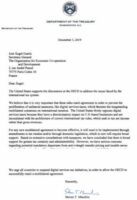
US response to OECDs Unified Approach
Letter from the US treasury to the OECD concerning the proposed Unified Approach on taxation of the Digital Economy, and the reply to the letter from the OECD.

France vs Google, September 2019, Court approval of CJIP Agreement – Google agrees to pay EUR 1 billion in fines and taxes to end Supreme Court Case
The district court of Paris has approved a “convention judiciaire d’intérêt public” negotiated between the French state and Google for an amount of € 500 million plus another agreement with the French tax authorities which amounts to 465 million euros. The agreement puts an end to the French lawsuits against Google for aggressive tax evasion, and litigation with the tax administration relating to adjustments for the periods going from 2005 to 2018. The CJIP “convention judiciaire d’intérêt public“, was established by Article 22 of Law No. 2016-1691 of 9 December 2016 in France on transparency and fight against corruption. By Law No. 2018-898 of October 23, 2018 the law was extended to cover cases for tax evasion. According to the CJIP legal actions can be ended in return for the payment of a fine. The dispute concerned the existence of a permanent establishment of Google Ireland in France. In Googles European headquarters in Ireland the corporate tax rate is (12.5%). However, according to the French tax authorities most of the profits related to the French marked was attributable to a Permanent establishment in France. The case was first brought before the Administrative Court in Paris (July 2017) and then the Paris Administrative Court of Appeal (April 2019). Both courts found in favor of Google and canceled the tax adjustments. The state then brought the case before the French Supreme Court and now – to end the proceedings – Google has entered into the CJIP agreement. According to the agreement Google will not have to admit to tax avoidance or evasion. Click here for translation The full CJIP agreement between France and Google have been published on the website of the French Agency for Anti-corruption. Click here for translation
US vs Amazon, August 2019, US Court of Appeal Ninth Circut, Case No. 17-72922
In the course of restructuring its European businesses in a way that would shift a substantial amount of income from U.S.-based entities to the European subsidiaries, appellee Amazon.com, Inc. entered into a cost sharing arrangement in which a holding company for the European subsidiaries made a “buy-in” payment for Amazon’s assets that met the regulatory definition of an “intangible.” See 26 U.S.C. § 482. Tax regulations required that the buy-in payment reflect the fair market value of Amazon’s pre-existing intangibles. After the Commissioner of Internal Revenue concluded that the buy-in payment had not been determined at arm’s length in accordance with the transfer pricing regulations, the Internal Revenue Service performed its own calculation, and Amazon filed a petition in the Tax Court challenging that valuation. At issue is the correct method for valuing the preexisting intangibles under the then-applicable transfer pricing regulations. The Commissioner sought to include all intangible assets of value, including “residual-business assets” such as Amazon’s culture of innovcation, the value of workforce in place, going concern value, goodwill, and growth options. The panel concluded that the definition of “intangible” does not include residual-business assets, and that the definition is limited to independently transferrable assets. The Court of Appeal concluded “We therefore agree with the tax court that the former regulatory definition of an “intangible” does not include residualbusiness assets.” The Court thus affirmed the prior decision of the tax court
France vs. Google, April 2019, Administrative Court of Appeal, Case N° 17PA03065
The French tax administration argued that Google had a permenent establishment in France because the parent company in the US and its subsidiary in Ireland had been selling a service – online ads – to customers in France. In 2017 the administrative court found that Google France did not have the capability to carry out the advertising activities on its own. Google Ireland Limited therefore did not have a permanent establishment in France. The same conclution was reached i 2019 by the Administrative court of appeal. Click here for translation
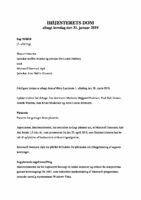
Denmark vs Microsoft Denmark, January 2019, Danish Supreme Court, Case No SKM2019.136.HR
The Danish tax authorities were of the opinion that Microsoft Denmark had not been properly remunerated for performing marketing activities due to the fact that OEM sales to Danish customers via MNE OEM’s had not been included in the calculation of local commissions. According to the Market Development Agreement (MDA agreement) concluded between Microsoft Denmark and MIOL with effect from 1 July 2003, Microsoft Denmark received the largest amount of either a commission based on sales invoiced in Denmark or a markup on it’s costs. Microsoft Denmark’s commission did not take into account the sale of Microsoft products that occurred through the sale of computers by multinational computer manufacturers with pre-installed Microsoft software to end users in Denmark – (OEM sales). In court, Microsoft required a dismissal. In a narrow 3:2 decision the Danish Supreme Court found in favor of Microsoft. “…Microsoft Denmark’s marketing may have had some derivative effect, especially in the period around the launch in 2007 of the Windows Vista operating system, which made higher demands on the computers. On the other hand, it must be assumed that also the recommendations of Microsoft products made by the multinational computer manufacturers under agreements between, among others, Dell and Microsoft Denmark’s American parent company, which, in return, gave discounts to computer manufacturers, may have had an effect on, among other things. sales of Package licenses in Denmark, whereby Microsoft Denmark, in its remuneration, benefited from this marketing effort. The significance of the various companies’ marketing efforts and the interaction between them has not been elucidated during the case, and we find it unlikely that Microsoft Denmark’s marketing had an effect on the sale of MNA OEM licenses in the US and other countries outside Denmark, which exceeded the importance of computer manufacturers marketing for the sale of package licenses, which were included in the basis for the remuneration of Microsoft Denmark. … Based on the above, we do not find that Microsoft Denmark’s remuneration for the company’s marketing efforts was not in accordance with the arm’s length principle.” Click here for translation
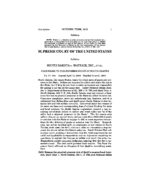
US SOUTH DAKOTA v. WAYFAIR, INC., June 2018, US Supreme Court, Case No. 17-494
Concerned about the erosion of its sales tax base and corresponding loss of critical funding for state and local services, the South Dakota Legislature in 2016 enacted a law requiring out-of-state sellers to collect and remit sales tax “as if the seller had a physical presence in the State.” The Act covers sellers that, on an annual basis, deliver more than $100,000 of goods or services into the State or engage in 200 or more separate transactions for the delivery of goods or services into the State. Respondents, top online retailers with no employees or real estate in South Dakota, each meet the Act’s minimum sales or transactions requirement, but do not collect the State’s sales tax. South Dakota filed suit in state court, seeking a declaration that the Act’s requirements are valid and applicable to respondents and an injunction requiring respondents to register for licenses to collect and remit the sales tax. Respondents sought summary judgment, arguing that the Act is unconstitutional. In a 5-4 opinion the Court overturned its earlier precedents (Quill Corp. v. North Dakota) and rejected the physical presence requirement. The Court said its earlier decisions had been wrongly decided and that the physical presence rule creates cross-border “distortions” and discourages out-of-state sellers from having an in-state physical presence and encourages customers to buy from out-of-state vendors. Based on the ruling states can now require remote sellers (online retailers) that do not maintain a physical presence/place of business in a state to register, collect and remit sales and use taxes on transactions with instate customers.
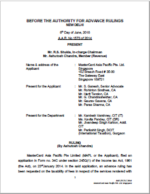
India vs Mastercard, June 2018, AAR No 1573 of 2014
The issue in this case was whether Mastercard Asien Pasific Ltd has a permanent establishment in India as regards the use of a global network and infrastructure to process card payment transactions for customers in India and as regards other related activities. India’s Authority for Advance Rulings found that that Mastercard’s activities in India created a permanent establishment under several different theories. The AAR also concluded that processing fees paid to Mastercard’s regional headquarters in Singapore by Indian banks and other financial institutions were royalty income, but would be taxable as business profits in India under Article 7 in the DTT between India and Singapore for being effectively connected with a PE of Mastercard Asia Pacific in India. AAR ruling:
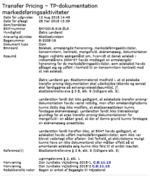
Denmark vs Microsoft Denmark, March 2018, Danish National Court, SKM2018.416.ØLR
The Danish Tax Ministry and Microsoft meet in Court in a case where the Danish tax authorities had issued an assessment of DKK 308 million. The Danish tax authorities were of the opinion that Microsoft had not been properly remunerated for performing marketing activities due to the fact that OEM sales to Danish customers via MNE OEM’s had not been included in the calculation of local commissions. In court, Microsoft required a dismissal with reference to the fact that Sweden, Norway and Finland had either lost or resigned similar tax cases against Micorosoft. The National Court ruled in favor of Microsoft. The decision was later confirmed by the Supreme Court. Click here for translation
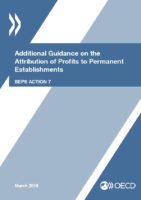
Additional guidance on the attribution of profits to permanent establishments
The OECD has released additional guidance on the attribution of profits to permanent establishments. This additional guidance sets out high-level general principles for the attribution of profits to permanent establishments arising under Article 5(5), in accordance with applicable treaty provisions, and includes examples of a commissionnaire structure for the sale of goods, an online advertising sales structure, and a procurement structure. It also includes additional guidance related to permanent establishments created as a result of the changes to Article 5(4), and provides an example on the attribution of profits to permanent establishments arising from the anti-fragmentation rule included in Article 5(4.1). See also the 2008 Guidance and 2010 Guidance.

France vs Valueclick Ltd. March 2018, Administrative Court, Case no 17PA01538
The issue in the case before the Administrative Court of Appeal of Paris was whether an Irish company had a PE in France in a situation where employees of a French company in the same group carried out marketing, representation, management, back office and administrative assistance services on behalf of the group. The following facts were used to substantiate the presence of a French PE: French employees negotiated the terms of contracts and were involved in drafting certain contractual clauses with the customers. Contracts were automatically signed by the Irish company – whether this action corresponded to a simple validation of the contracts negotiated and drawn up by the managers and employees in France. Local advertising programs were developed and monitored by employees in France. French employees acted to third parties as employees of the Irish company. Customers did not distinguish between the Irish and the French company. However, the Administrative Court found that none of these factors established that employees in France had been authorized to act on behalf of and in the name of the Irish company. The Court instead based the decision on whether contracts could be entered and services could be rendered without prior approval of the contracts by the Irish parent entity. The Court concluded that French employees could not commit its Irish principal contractually and services could not be rendered until the customer contract had been approved by the Irish company. The decision of the Administrative Court has now been appealed to the French Supreme Court. On the issue of permanent establishment, see also the French Zimmer decision from 2010 and the later Google decision from 2017. Click here for translation

UK vs. Apple, Jan. 2018, Payment of £136 million
Apple has paid an additional £136m taxes in a settlement with the UK. The settlement is revealed in Apple Europe’s 2017 accounts. “Following an extensive audit by Her Majesty’s Revenue and Customs (HMRC) the Company agreed to pay a corporate income tax adjustment of £136m covering prior years up to September 26, 2015. This payment of additional tax and interest reflects the Company’s increased activity and is recognized in the current financial period which ended on 1 April 2017. As a result of this adjustment the Company’s corporate income tax payments will increase going forward.” Most likely, the HMRC has found that the UK subsidiary had not received a large enough sales- and marketing commission from the Irish Apple sales hub.
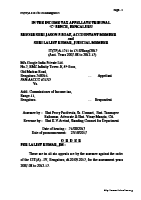
India vs Google, Oct. 2017, Income Tax Appellate Tribunal
Google Ireland licenses Google AdWords technology to its subsidiary in India and several other countries across the world. The Tax Tribunal in India found that despite the duty of Google India to withhold tax at the time of payment to Google Ireland, no tax was withheld. This was considered tax evasion, and Google was ordered to pay USD 224 million. The case has now been appealed by Google to the Supreme Court of India.
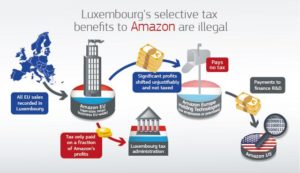
European Commission vs. Amazon and Luxembourg, October 2017, State Aid – Comissions decision, SA.38944
Luxembourg gave illegal tax benefits to Amazon worth around €250 million The European Commission has concluded that Luxembourg granted undue tax benefits to Amazon of around €250 million. Following an in-depth investigation launched in October 2014, the Commission has concluded that a tax ruling issued by Luxembourg in 2003, and prolonged in 2011, lowered the tax paid by Amazon in Luxembourg without any valid justification. The tax ruling enabled Amazon to shift the vast majority of its profits from an Amazon group company that is subject to tax in Luxembourg (Amazon EU) to a company which is not subject to tax (Amazon Europe Holding Technologies). In particular, the tax ruling endorsed the payment of a royalty from Amazon EU to Amazon Europe Holding Technologies, which significantly reduced Amazon EU’s taxable profits. The Commission’s investigation showed that the level of the royalty payments, endorsed by the tax ruling, was inflated and did not reflect economic reality. On this basis, the Commission concluded that the tax ruling granted a selective economic advantage to Amazon by allowing the group to pay less tax than other companies subject to the same national tax rules. In fact, the ruling enabled Amazon to avoid taxation on three quarters of the profits it made from all Amazon sales in the EU. Amazon’s structure in Europe The Commission decision concerns Luxembourg’s tax treatment of two companies in the Amazon group – Amazon EU and Amazon Europe Holding Technologies. Both are Luxembourg-incorporated companies that are fully-owned by the Amazon group and ultimately controlled by the US parent, Amazon.com, Inc. Amazon EU (the “operating company”) operates Amazon’s retail business throughout Europe. In 2014, it had over 500 employees, who selected the goods for sale on Amazon’s websites in Europe, bought them from manufacturers, and managed the online sale and the delivery of products to the customer.Amazon set up their sales operations in Europe in such a way that customers buying products on any of Amazon’s websites in Europe were contractually buying products from the operating company in Luxembourg. This way, Amazon recorded all European sales, and the profits stemming from these sales, in Luxembourg. Amazon Europe Holding Technologies (the “holding company”) is a limited partnership with no employees, no offices and no business activities. The holding company acts as an intermediary between the operating company and Amazon in the US. It holds certain intellectual property rights for Europe under a so-called “cost-sharing agreement” with Amazon in the US. The holding company itself makes no active use of this intellectual property. It merely grants an exclusive license to this intellectual property to the operating company, which uses it to run Amazon’s European retail business. Under the cost-sharing agreement the holding company makes annual payments to Amazon in the US to contribute to the costs of developing the intellectual property. The appropriate level of these payments has recently been determined by a US tax court. Under Luxembourg’s general tax laws, the operating company is subject to corporate taxation in Luxembourg, whilst the holding company is not because of its legal form, a limited partnership.Profits recorded by the holding company are only taxed at the level of the partners and not at the level of the holding company itself. The holding company’s partners were located in the US and have so far deferred their tax liability. Amazon implemented this structure, endorsed by the tax ruling under investigation, between May 2006 and June 2014. In June 2014, Amazon changed the way it operates in Europe. This new structure is outside the scope of the Commission State aid investigation. The scope of the Commission investigation The role of EU State aid control is to ensure Member States do not give selected companies a better tax treatment than others, via tax rulings or otherwise. More specifically, transactions between companies in a corporate group must be priced in a way that reflects economic reality. This means that the payments between two companies in the same group should be in line with arrangements that take place under commercial conditions between independent businesses (so-called “arm’s length principle”). The Commission’s State aid investigation concerned a tax ruling issued by Luxembourgto Amazon in 2003 and prolonged in 2011. This ruling endorsed a method to calculate the taxable base of the operating company. Indirectly, it also endorsed a method to calculate annual payments from the operating company to the holding company for the rights to the Amazon intellectual property, which were used only by the operating company. These payments exceeded, on average, 90% of the operating company’s operating profits. They were significantly (1.5 times) higher than what the holding company needed to pay to Amazon in the US under the cost-sharing agreement. To be clear, the Commission investigation did not question that the holding company owned the intellectual property rights that it licensed to the operating company, nor the regular payments the holding company made to Amazon in the US to develop this intellectual property. It also did not question Luxembourg’s general tax system as such. Commission assessment The Commission’s State aid investigation concluded that the Luxembourg tax ruling endorsed an unjustified method to calculate Amazon’s taxable profits in Luxembourg. In particular, the level of the royalty payment from the operating company to the holding company was inflated and did not reflect economic reality. The operating company was the only entity actively taking decisions and carrying out activities related to Amazon’s European retail business. As mentioned, its staff selected the goods for sale, bought them from manufacturers, and managed the online sale and the delivery of products to the customer. The operating company also adapted the technology and software behind the Amazon e-commerce platform in Europe, and invested in marketing and gathered customer data. This means that it managed and added value to the intellectual property rights licensed to it. The holding company was an empty shell that simply passed on the intellectual property rights to the operating company for its exclusive use. The holding company was not itself in any way
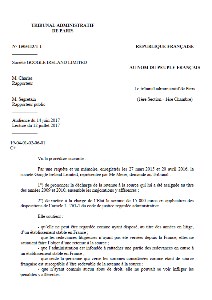
France vs. Google, July 2017, Administrative Court
The French tax administration argued that Google had a permenent establishment in France because the parent company in the US and its subsidiary in Ireland had been selling a service – online ads – to customers in France. The administrative court found that Google France did not have the capability to carry out the advertising activities on its own. Google Ireland Limited therefore did not have a permanent establishment in France. Click here for translation
Indonesia vs Google, June 2017, Settlement PE
In June 2017, the Indonesian government announced that it had settled a lengthy tax dispute with Google for 2016. While the settlement sum has not been disclosed, it is perceived as setting a new tone in the interpretation of permanent establishment status for tech companies.
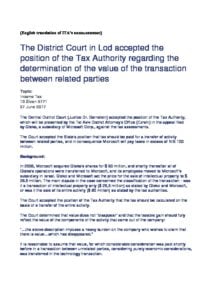
Israel vs. Gteko Ltd (Microsoft), June 2017, District Court
In November 2006 Microsoft Corp. purchased 100% of the shares of Gteko Ltd. (IT Support technology), for USD 90 million. The purchase was made with the intention of integrating Gteko’s technology into Microsoft’s own products. Following this purchase of Gteko Ltd., the employees were transferred to the local Microsoft subsidiary and a few months later another agreement was entered transferring Gteko’s intellectual property/intangibles to Microsoft. This transfer was priced at USD 26 million based on the purchase price allocation (PPA). The tax authorities of Israel found that the price of 26 mio USD used in the transaction was not at arm’s length. It was further argued, that the transaction was not only a transfer of some intangibles but rather a transfer of all assets owned by Gteko as a going concern to Microsoft Corp. The arm’s length price for the transfer was set at USD 80 million. The District Court agreed with the assessment and held that “value does not disappear or evaporate” and that Gteko had not succeeded in arguing why the total values in Gteko should not be equal to the $90 million share price paid.

US vs Microsoft, May 2017, US District Court
In an ongoing transfer pricing battle between Microsoft and the IRS related to Microsofts’ use of a IP subsidiary in Puerto Rico to shift income and reduce taxes, the District Court of Washington has now ordered Microsoft to provide a number of documents as requested by the IRS. In a prior decision from November 2015 the District Court ruled, that the IRS’ use of an external representative was not in conflict with US regulations. Microsoft argued that the IRS’ use of an outside law firm, Quinn Emanuel Urquhart & Sullivan, to assist in the audit was an improper delegation of its authority to examine taxpayer books. The Court ruled that the government had a legitimate purpose in continuing to pursue the audit, and that the use of Quinn Emanuel was not a breach of IRS authority that would invalidate the summonses. “The court’s role in this matter is not to pass judgment on the IRS’ contracting practices, but to enforce or not enforce the summonses,” Martinez wrote. The law allows the IRS some flexibility in its use of outside contractors, he said, and Microsoft’s characterization of the role of Quinn Emanuel “greatly exceeds what is evident in the record.”
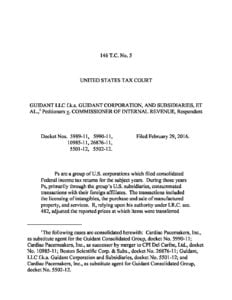
US vs. Amazon, March 2017, US Tax Court, Case No. 148 T.C. No 8
Amazon is an online retailer that sells products through Amazon.com and related websites. Amazon also sells third-party products for which it receives a commissions. In a series of transactions in 2005 and 2006, Amazon US transferred intangibles to Amazon Europe, a newly established European HQ placed in Luxembourg. A Cost Sharing Arrangement (“CSA”), whereby Amazon US and Amazon Europe agreed to share costs of further research, development, and marketing in proportion to the benefits A License Agreement, whereby Amazon US granted Amazon Europe the right to Amazon US’s Technology IP An Assignment Agreement, whereby Amazon US granted Amazon Europe the right to Amazon US’s Marketing IP and Customer Lists. For these transfers Amazon Europe was required to make an upfront buy-in payment and annual payments according to the cost sharing arrangement for ongoing developments of the intangibles. In the valuation, Amazon had considered the intangibles to have a lifetime of 6 to 20 years. On that basis, the buy-in payment for pre-existing intangibles had been set to $254.5 million. The IRS disagreed with the valuation and calculated a buy-in payment of $3.5 billion, by applying a discounted cash-flow methodology to the expected cash flows from the European business. The IRS took the position, that the intangibles transferred to Amazon Europe had an indefinite useful life and had to be valued as integrated components of an ongoing business rather than separate assets. The case brought before the US Tax Court HAD two issues had to be decided: Amazon Europe’s buy-in payment with respect to the intangibles transferred; and The pool of cost, on which Amazon Europe ongoing cost sharing payments were to be calculated. The Courts decision on Amazon Europe’s buy-in payment IRS’s position of “indefinite useful life” in the valuation of the intangibles and the buy in payment was rejected by the court, and the comparable uncontrolled transaction (“CUT”) method applied by Amazon – after appropriate upward adjustments – was found to be the best method. The Courts decision on Cost Share Payments The Court found that Amazon’s method for allocating intangible development costs, after adjustments, was reasonable. US CSA regulations pre- and post 2009 US CSA regs in effect for 2005-2006 refer to the definition of intangibles set forth in section 1.482-4(b), Income Tax Regs. Here intangibles are defined to include five enumerated categories of assets, each of which has “substantial value independent of the services of any individual.” These include patents, inventions, copyrights, know-how, trademarks, trade names, and 20 other specified intangibles. The definition of intangibles in the pre 2009 CSA regs did not include value of workforce in place, going concern value, goodwill, and growth options, corporate resources or opportunities. In 2009 new CSA regs were introduced in the US where the concept of “platform contribution transaction” (PCT) applies. According to the new regs. there are no limit on the type of intangibles that must be compensated under a cost sharing arrangement. But these new US CSA regulations did not apply to the years 2005 – 2006 in the Amazon case. See also the US vs. Veritas case from 2009. 2019 UPDATE The 2017 decision of the Tax Court has later been appealed by the Commissioner of Internal Revenue

US Treasury response to European Commission for recent State Aid Actions, 2016
The US Treasury in 2016 strongly criticized the European Commission for it’s state aid actions relating to US Corporations; Apple, Starbucks, Amazon, and McDonald’s. US Treasury white paper of August 2016 US Treasury letter of February 2016
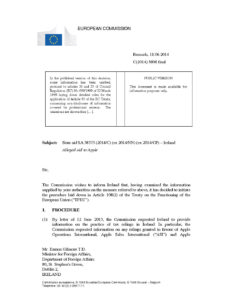
European Commission vs. Ireland and Apple, August 2016, State Aid Decision
According to the European Commission Ireland gave illegal tax benefits to Apple worth up to €13 billion The European Commission has concluded that Ireland granted undue tax benefits of up to €13 billion to Apple. This is illegal under EU state aid rules, because it allowed Apple to pay substantially less tax than other businesses. Ireland must now recover the illegal aid.
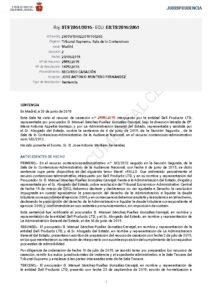
Spain vs Dell, June 2016, Supreme Court, Case No. 1475/2016
Dell Spain is part of a multinational group (Dell) that manufactures and sells computers. Dell Ireland, operates as distribution hub for most of Europe. Dell Ireland has appointed related entities to operate as its commissionaires in several countries; Dell Spain and Dell France are part of this commissionaire network. The group operates through a direct sales model and sales to private customers in Spain are conducted by Dell France, through a call centre and a web page. Dell Spain use to operate as a full-fledged distributor, but after entering into a commissionaire agreement Dell Spain now served large customers on behalf of Dell Ireland. A tax assessment was issued by the tax authorities. According to the assessment the activities in Spain constituted a Permanent Establishment of Dell Ireland to which profits had to allocated for FY 2001-2003. Judgement of the Supreme Court The Supreme Court concludes that the activities of Dell Spain constitutes a Permanent Establishment of Dell Ireland under both the “dependent agent” and “fixed place of business” clauses of the treaty. The expression “acting on behalf of an enterprise” included in article 5.5 of the Spain-Ireland tax treaty does not necessarily require a direct representation between the principal and the commissionaire, but rather refers to the ability of the commissionaire to bind the principal with the third party even when there is no legal agreement between the latter two. Furthermore, the Supreme Court considers that Dell Spain cannot be deemed as an independent agent since it operated exclusively for Dell Ireland under control and instructions from the same. Regarding the “fixed place of business”, the Supreme Court states that having a place at the principal’s disposal also includes the use of such premises through another entity which carries out the principal’s activity under its supervision. This Court also explained that considering a company as a PE is not only based on its capacity to conclude contracts that bind the company but also on the functional and factual correlation between the agent and the company in the sense that the agent has sufficient authority to bind the company in its day to day business, following the instructions of the company and under its control. In regards to question of Employee stock option expences, the Court partially upheld the claim of Dell and stated “”expenses that are correlated with income” are deductible expenses. Consequently, any expense correlated with income is an accounting expense, and if any accounting expense is a deductible expense in companies, with no exceptions other than those provided for by law” Click here for English translation Click here for other translation
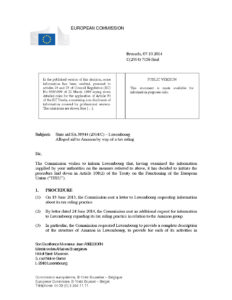
European Commission opens investigation of transfer pricing arrangements on corporate taxation of Amazon in Luxembourg, October 2014
The European Commission has opened an in-depth investigation to examine whether the decision by Luxembourg’s tax authorities with regard to the corporate income tax to be paid by Amazon in Luxembourg comply with the EU rules on state aid. The opening of an in-depth investigation gives interested third parties and the Member States concerned an opportunity to submit comments. It does not prejudge the outcome of the investigation. The tax ruling in favour of Amazon under investigation dates back to 2003 and is still in force. It applies to Amazon’s subsidiary Amazon EU Sàrl, which is based in Luxembourg and records most of Amazon’s European profits. Based on a methodology set by the tax ruling, Amazon EU Sàrl pays a tax deductible royalty to a limited liability partnership established in Luxembourg but which is not subject to corporate taxation in Luxembourg. As a result, most European profits of Amazon are recorded in Luxembourg but are not taxed in Luxembourg. The Commission considers that the amount of this royalty, which lowers the taxable profits of Amazon EU Sàrl each year, might not be in line with market conditions. The Commission has concerns that the ruling could underestimate the taxable profits of Amazon EU Sàrl, and thereby grant an economic advantage to Amazon by allowing the group to pay less tax than other companies whose profits are allocated in line with market terms. The Commission will now continue investigating to determine whether its concerns are confirmed.
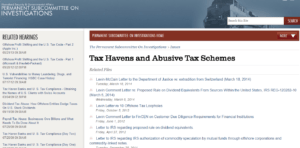
US Senate Hearings on Offshore Profit Shifting and Abusive Tax Schemes
See the documents from the US Senate hearings on offshore profit shifting and abusive tax schemes Offshore Profit Shifting and the U.S. Tax Code – Part 1 (Microsoft & Hewlett-Packard) and Part 2 (Apple Inc.), Carl Levin’s opening statements.
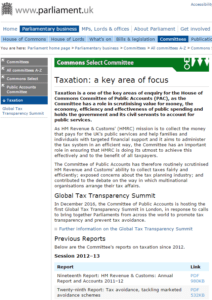
UK Parliament, House of Commons, Committee of Public Accounts, Hearings on Tax Avoidance Schemes
Follow the work of the UK Parliament, House of Commons Committee of Public Account, on corporate tax avoidance schemes. http://www.parliament.uk/business/committees/committees-a-z/commons-select/public-accounts-committee/taxation/ Statements from Amazon, Google and Starbucks, November 2012 Statement from Google June 2013
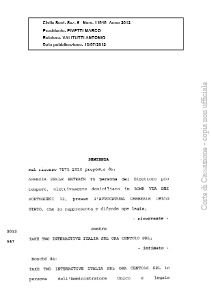
Italy vs Take Two Interactive Italia s.r.l., July 2012, Supreme Court, no 11949/2012
In this case the Italien company, T. S.r.l. is entirely controlled by H. S.A., registered in Switzerland, and is part of the American multinational group T., being its only branch in Italy for the exclusive marketing of its software products (games for personal computers, play station, etc.). T. S.r.l. imports these products through T. Ltd (which is also part of the same multinational group and controlled by the same parent company), which is registered in the United Kingdom and is the sole supplier of the products that are marketed by the Italian branch. On 31st October 2004 (the last day of the financial year), T. S.r.l. posted an invoice that the British company T. Ltd had issued on that date for £ 947,456. This accounts document referred to “Price adjustment to product sold during FY 2003/2004”, and charges the Italian company with adjustment increases to previously applied prices relative to certain software products the company had purchased during the aforesaid financial year. The Inland Revenue challenged the operation claiming it was evasive, and addressed to reducing the taxable profit of the Italian company by the abusive use of transfer pricing. To back up these claims the Inland Revenue emphasised that: • the operation was carried out on the last day of the financial year; • it involved posting an invoice for the adjustment increases to previously applied prices by the English supplier company; • the prices differ from the average purchase price for the same products by T. S.r.l.. Supreme Court established that: “(…)the application of transfer pricing regulations does not fight the concealment of the price, which is a form of evasion, but the manoeuvres that affect an evident price, allowing the surreptitious transfer of profits from one country to another, which has a tangible effect on the applicable tax regime. Therefore, given these essential requirements it must be considered that this regulation constitutes – according to the more widespread interpretation in case law in this court – an anti-avoidance provision (…)”. The infringement of an anti-avoidance provision means that the burden of proof for recourse to this premise of fact, in principle is the responsibility of the Inland Revenue office that intends carrying out the controls. Therefore, the Supreme Court felt that: “(…) when determining company income, or rather, the problem of sharing the intra-group costs, the question of pertinence must be considered as well as the existence of the declared costs further to charging for a service or asset transfer to the subsidiary from the holding, or another company that is controlled by the same company (…). The burden for demonstrating the existence and pertinence of these negative income items, and, as in the case in question, it concerns costs derived from services or assets loaned or transferred by a foreign holding to an Italian subsidiary, each element that enables the inland revenue to verify the arm’s length value of the relative costs – further to the so-called principle of sphere of influence– can only be the responsibility of the taxpayer”. Transfer pricing legislation is included among the anti-avoidance dispositions, as it is addressed to fight the transfer of income from one country to another by “manipulating” the intra-group costs. Consequently, the burden of proof that there are the premises of fact of evasion lies, mainly, with the Inland Revenue, which should prove the grounds for the adjustment, or the deviation from the applied cost with respect to the arm’s length value. However, as the sharing of intra-group costs also involves the matter of whether the costs exist and are pertinent, the burden of proof of the costs to the company’s business lies with the taxpayer according to the Supreme Court. The Italien Supreme Court have drawn a distinction between cases regarding income and cases regarding expenses. In cases regarding income the burden of proof lies with the tax authorities. In cases regarding costs, the burden of proof lies with the taxpayer. Click here for English translation Click here for other translation
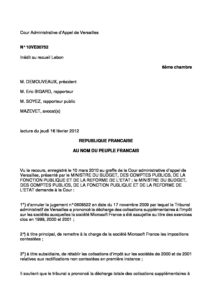
France vs. Microsoft, Feb 2012, CCA, No 10VE00752
In the Microsoft case, the distribution activity of a French subsidiary of an American group was transferred to its Irish sister company. The French subsidiary was then converted into a sales agent of the Irish subsidiary. The Commission rate earned by the French subsidiary was reduced from 25% to 18%. The French tax authorities, taking into account the previous 25% commission rate, considered that it should not have been reduced and reinstated the corresponding income into the French company’s taxable income. To support their position, the French tax authorities conducted a benchmarking study. However, the Court of Appeals ruled that the mere fact that the commission rate has been reduced does not demonstrate the transfer of profits abroad. Moreover, the Court confirmed that the transfer of profits abroad was not proved due to the irrelevance of the methods used and of the comparables found by the French tax authorities. The companies were not suitable for comparison because they were not in the same market as Microsoft France and that some of them were not independent companies. Click here for translation
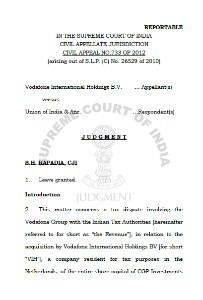
India vs Vodafone International Holdings BV, 2012, Supreme Court
In the Vodafone case, the Supreme Court of India found that tax planning within the law will be valid as long as it does not amount to a colourable device.
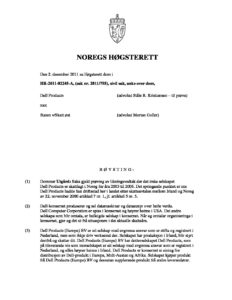
Norge vs. Dell Norge. December 2011, HRD saknr 2011-755
The Irish company Dell Products was taxable in Norway for years 2003-2006. The issue was whether Dell Products had a permenent establishment in Norway, cf. Article 5. 5 in the tax treaty between Ireland and Norway from 2000. Dell Products sold PC’s and equipment by a commission agreement in which the Irish company was Principal and the Norwegian company Dell AS was commissioner. Both the companies are part of the Dell group. Dell AS sold to customers who were large enterprises and the public sector. It was not disputed that the agreement was not legally binding on Dell Products in relation to customers. Dell Products would have a permanent establishment in Norway and may be taxable Norway, if Dell Norway had acted “on behalf of” and had the “authority to conclude contracts on behalf of the” Dell, ref. Tax Treaty Article 5. 5. Unlike the District Court and the Court of Appeal the Supreme Court did not wote in favor of the tax authorities. The wording of the article strongly support that the commissioner must bind the principal in relation to the customer. The article is identical to the OECD Model Convention, and it had the same weight that also the commentary for this support a requirement for judicial bond. Also other legal sources pointed in the same conclusion. When both the wording and other legal sources support this condition, Article 5. 5 cannot lead to an anna result. The Supreme Court came to the conclusion that Dell Products did not have a permanent establishment in Norway. Click here for translation
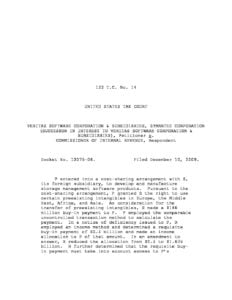
US vs. Veritas Software Corporation, December 2009
The issue in the VERITAS case involved the calculation of the buy-in payment under VERITAS’ cost sharing arrangement with its Irish affiliate. VERITAS US assigned all of its existing European sales agreements to VERITAS Ireland. Similarly,VERITAS Ireland was given the rights to use the covered intangibles and to use VERITAS US’s trademarks, trade names and service marks in Europe, the Middle East and Africa, and in Asia-Pacific and Japan. In return, VERITAS Ireland agreed to pay royalties to VERITAS US in exchange for the rights granted. The royalty payment included a prepayment amount (i.e. lump-sum payment) along with running royalties that were subject to revision to maintain an arm’s length rate. Thereafter, VERITAS Ireland began co-developing, manufacturing and selling VERITAS products in the Europe, the Middle East and Africa markets as well as in the Asia-Pacific and Japan markets. These improvements, along with the establishment of new management, allowed VERITAS’ 2004 annual revenues to be five times higher than its 1999 revenues from Europe, the Middle East and Africa, and Asia-Pacific and Japan. the IRS’s economic expert employed the income method to calculate the buy-in payment (for pre-existing intangibles that were to be used by the parties to develop future technology under the cost sharing arrangement). These calculations were based on the assumption that the transfer of pre-existing intangibles by VERITAS US was “akin to a sale” and should be evaluated as such. To value the transfer, the IRS expert aggregated the intangibles so that, in effect, he treated the transfer as a sale of VERITAS US’s business, rather than a sale of each separate intangible asset. The aggregation of the intangibles was necessary, in the view of the IRS expert, because the assets collectively (the package of intangibles) possessed synergies and, as a result, the package of intangibles was more valuable than each individual intangible asset standing alone. The Court rejected the IRS’s method on the following premises: The IRS did not differentiate between the value of subsequently developed intangibles and pre-existing intangibles, thus including intangibles beyond what is required for the buy-in payment; The IRS included intangibles such as access to VERITAS US’s marketing and R&D teams, which are not among the intangibles recognized by the US transfer pricing rules; and The IRS incorrectly assigned a perpetual useful life for transferred intangibles that have a useful life of four years.
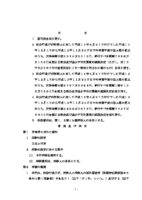
Japan vs Adobe Systems Co., October 2008, Tokyo High Court
Adobe Systems Co., a Japanese subsidiary of Adobe Systems Inc., received remuneration from Dutch and Irish group companies for promotion and marketing of Adobe software sold in Japan The remuneration of Adobe Systems Co. was determined as general administrative expenses plus 1.5% of net sales in Japan. A transfer pricing assessment was issued by the Japanese tax authorities where transfer prices were instead based profit margins derived in comparable transactions. Adobe Systems filed an appeal seeking revokal of the assessment. Tokyo High Court held that the tax assessment should be revoked. The burden of proof in relation to the legitimacy of the transfer pricing method applied was on the tax administration. The transfer pricing method used by the tax authority was not consistent with the resale price method. The method applied by the tax authorities “…cannot be said to be “a method equivalent to the resale price standard method” prescribed in Article 66-4, Paragraph 2, Item 2, b of the Special Taxation Measures Law. Therefore, in this case, there is illegality in the process of calculating the inter-company price using this calculation method...” Click here for English translation
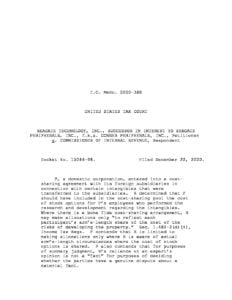
US vs Seagate Technology, December 2000, United States Tax Court
The IRS ruled that Seagate should have included the cost of employee stock options in the net revenue calculation associated with its cost-sharing agreement with its foreign subsidiaries. Seagate appealed the ruling on the grounds that the IRS was not aware of actual arm’s length circumstances relating to the employee stock option compensation. In this case, the United States Tax Court found in favor of the IRS.
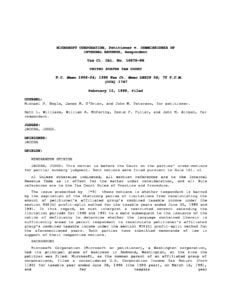
US vs. Microsoft Corp. February 1998
Microsoft appealed an IRS ruling, which had disallowed the use of the profit-split method to recalculate Microsoft’s taxable income. In this decision, the United States Tax Court found in Microsoft’s favor, granting the motion for summary judgment.
